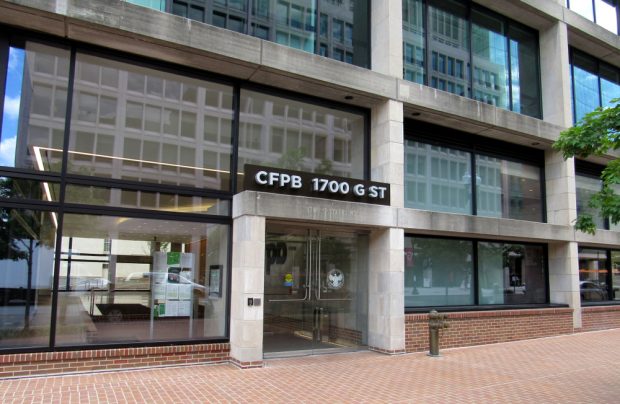 Entrance to the CFPB headquarters. (Source: Shutterstock)
Entrance to the CFPB headquarters. (Source: Shutterstock)
The CFPB appears to be on the cusp of announcing new proposed rulemaking later this month concerning credit card late fees without holding a hearing with a Small Business Regulatory Enforcement Fairness Act (SBREFA) panel. This move by the bureau, according to NAFCU, CUNA and three other banking trade groups, goes against the rulemaking process as defined by the SBREFA itself.
Last year the CFPB issued a notice of proposed rulemaking regarding credit card late fees in an apparent effort to reduce $12 billion in fees that are collected by financial institutions each year.
Recommended For You
The five trade groups issued a letter to the CFPB on Friday to remind the bureau that it could be in violation of the SBREFA if it issues a proposed rule that impacts credit card late fees. The groups also argued that the proposed rule could negatively impact credit unions, especially those under $850 million in assets.
The letter read, "As stated in the Credit Card Late Fees ANPR Comment Letter, any reduction in, or elimination of, the late fee safe harbor would have a significant adverse impact on a substantial number of community banks and credit unions, with assets below $850 million. As such, if the CFPB intends to proceed with a rulemaking, it must comply with the Small Business Regulatory Enforcement Fairness Act of 1996 (SBREFA), as a 'covered agency' designated by the Dodd-Frank Wall Street Reform and Consumer Protection Act (Dodd-Frank Act).
"In light of this obligation, we were surprised to see that the CFPB is at the Proposed Rule stage and, according to the CFPB's own submission to the Unified Agenda of Regulatory and Deregulatory Action (Unified Agenda), that the CFPB plans to issue a Notice of Proposed Rulemaking in January 2023.
"The Associations want to reiterate comments made in the Credit Card Late Fees ANPR Comment Letter, which demonstrated that any reduction in, or elimination of, the late fee safe harbor would have a significant adverse impact on a substantial number of financial institutions with less than $750 million in assets (the threshold subsequently was raised to $850 million). Accordingly, if the CFPB proceeds with rulemaking, as is suggested in the Unified Agenda, it must comply with its statutory obligations under SBREFA."
According to the SBREFA, the CFPB must "convene and chair" a panel if the bureau considers a proposed rule that could significantly impact a substantial number of smaller groups and/or financial institutions' financial well-being.
As of now, the CFPB appears to be going forward with its announcement of a proposed rulemaking still this month.
© Touchpoint Markets, All Rights Reserved. Request academic re-use from www.copyright.com. All other uses, submit a request to [email protected]. For more inforrmation visit Asset & Logo Licensing.







